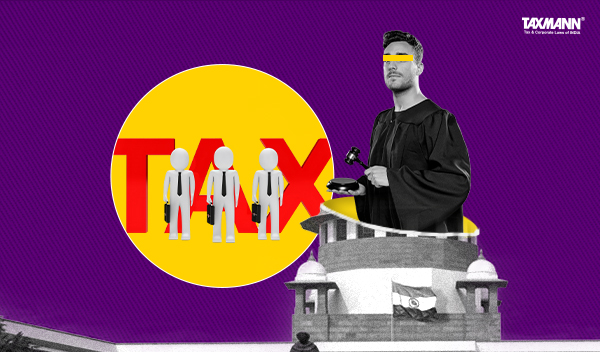Officer Couldn’t Be Held Liable for Not Deducting TDS on Interest on Compensation If He Was Following HC’s Order | HC
- Blog|News|Income Tax|
- 3 Min Read
- By Taxmann
- |
- Last Updated on 17 September, 2024

Case Details: Land Acquisition Officer, Urban Estate vs. Assistant Commissioner of Income-tax - [2024] 166 taxmann.com 325 (Punjab & Haryana)
Judiciary and Counsel Details
- Sanjeev Prakash Sharma & Sanjay Vashisth, JJ.
- Ms Radhika Suri, Sr. Adv., Abhinav Narang & Ms Parnika Singla, Advs. for the Appelant.
- Mrs Urvashi Dhugga, Sr. Standing Counsel for the Respondent.
Facts of the Case
The assessee, a Land Acquisition Officer at Urban Estate, was conducting the duty of disbursement of compensation, enhanced compensation, and interest thereon in lieu of acquisition of landowners’ land in terms of section 28 of the Land Acquisition Act, 1894. Till 2012, the assessee disbursed the interest on compensation and enhanced compensation by deducting tax at source in terms of section 194A. After October 2012, the assessee stopped deducting tax at source on interest payment in view of the order of the Punjab and Haryana High Court rendered in the case of Jogmal Singh v. State of Haryana [C R No. 7740 of 2020].
The Assessing Officer (AO), with regard to non-deduction of tax at source on the payment of interest on compensation/enhanced compensation, treated the assessee as assessee-in-default under section 201(1) and raised tax demand upon him.
Aggrieved by the order, the assessee filed a writ petition before the Punjab and Haryana High Court.
High Court Held
The High Court held that on the day when the assessee was disbursing the interest element on enhanced compensation to the concerned landowners whose lands have been acquired, litigation had been taken up before the Punjab and Haryana High Court with regard to the action of the assessee in deducting TDS upon such interest upto September 2012 under section 194A.
It is also an admitted position that various Courts, including the Punjab and Haryana High Court, granted a stay and also held that TDS is not required to be deducted from the interest payments. The assessee asked for a legal opinion. As per the instructions dated 9-10-2012 issued by the District Revenue Officer on the noting sheet, he was directed that as per the opinion of the Additional District Attorney, TDS may not be deducted.
In a case filed by the landowners, the Additional District Judge, Faridabad, held that the deduction of TDS was illegal, and the assessee was directed to pay the same to the landowners vide order dated 20-9-2014. In another case of HUDA v. Mandir Nar Singh Puri [C.R. No. 7953 of 2013, dated 21-12-2013], the Punjab and Haryana High Court passed order of restraining from deduction of TDS. Thus it is apparent that the TDS deduction was not made based on orders of the Court. It is also noticed that orders passed by the High Court were later on reviewed at the instance of the Income-tax department.
The revenue attempted to submit that there were other judgments of the High Court, wherein a different view had been taken holding that TDS can be deducted. However, she did not deny that the assessee and his department had, at the time of enquiry, submitted the reasons for the non-deduction of TDS.
Therefore, it cannot be said that the assessee was at fault. He was genuinely following the advice given to him by his superior officer, who was a District Revenue Officer, whose directions of not deducting TDS were based on legal advice. The legal advice was given based on the directions of the Punjab and Haryana High Court.
Therefore, the action of releasing the interest amount without deducting TDS, therefore, cannot be a reason for imposing liability in terms of section 201(1) and cannot be justified. The assessee cannot be made to suffer on account of the orders passed by the Court. Liability imposed on him by the Assessing Officer was liable to be set aside.
List of Cases Referred to
- CIT v. Ghanshyam (HUF) [2009] 182 Taxman 368/315 ITR 1 (SC) (para 3)
- CIT v. Bir Singh (para 12).
Disclaimer: The content/information published on the website is only for general information of the user and shall not be construed as legal advice. While the Taxmann has exercised reasonable efforts to ensure the veracity of information/content published, Taxmann shall be under no liability in any manner whatsoever for incorrect information, if any.

Taxmann Publications has a dedicated in-house Research & Editorial Team. This team consists of a team of Chartered Accountants, Company Secretaries, and Lawyers. This team works under the guidance and supervision of editor-in-chief Mr Rakesh Bhargava.
The Research and Editorial Team is responsible for developing reliable and accurate content for the readers. The team follows the six-sigma approach to achieve the benchmark of zero error in its publications and research platforms. The team ensures that the following publication guidelines are thoroughly followed while developing the content:
- The statutory material is obtained only from the authorized and reliable sources
- All the latest developments in the judicial and legislative fields are covered
- Prepare the analytical write-ups on current, controversial, and important issues to help the readers to understand the concept and its implications
- Every content published by Taxmann is complete, accurate and lucid
- All evidence-based statements are supported with proper reference to Section, Circular No., Notification No. or citations
- The golden rules of grammar, style and consistency are thoroughly followed
- Font and size that’s easy to read and remain consistent across all imprint and digital publications are applied



 CA | CS | CMA
CA | CS | CMA
